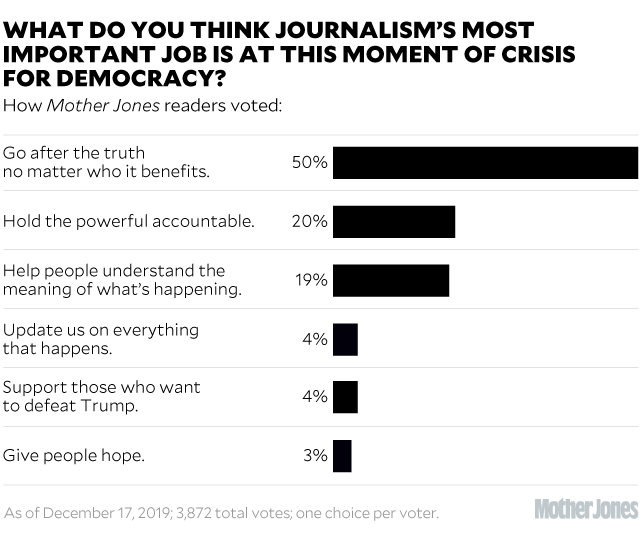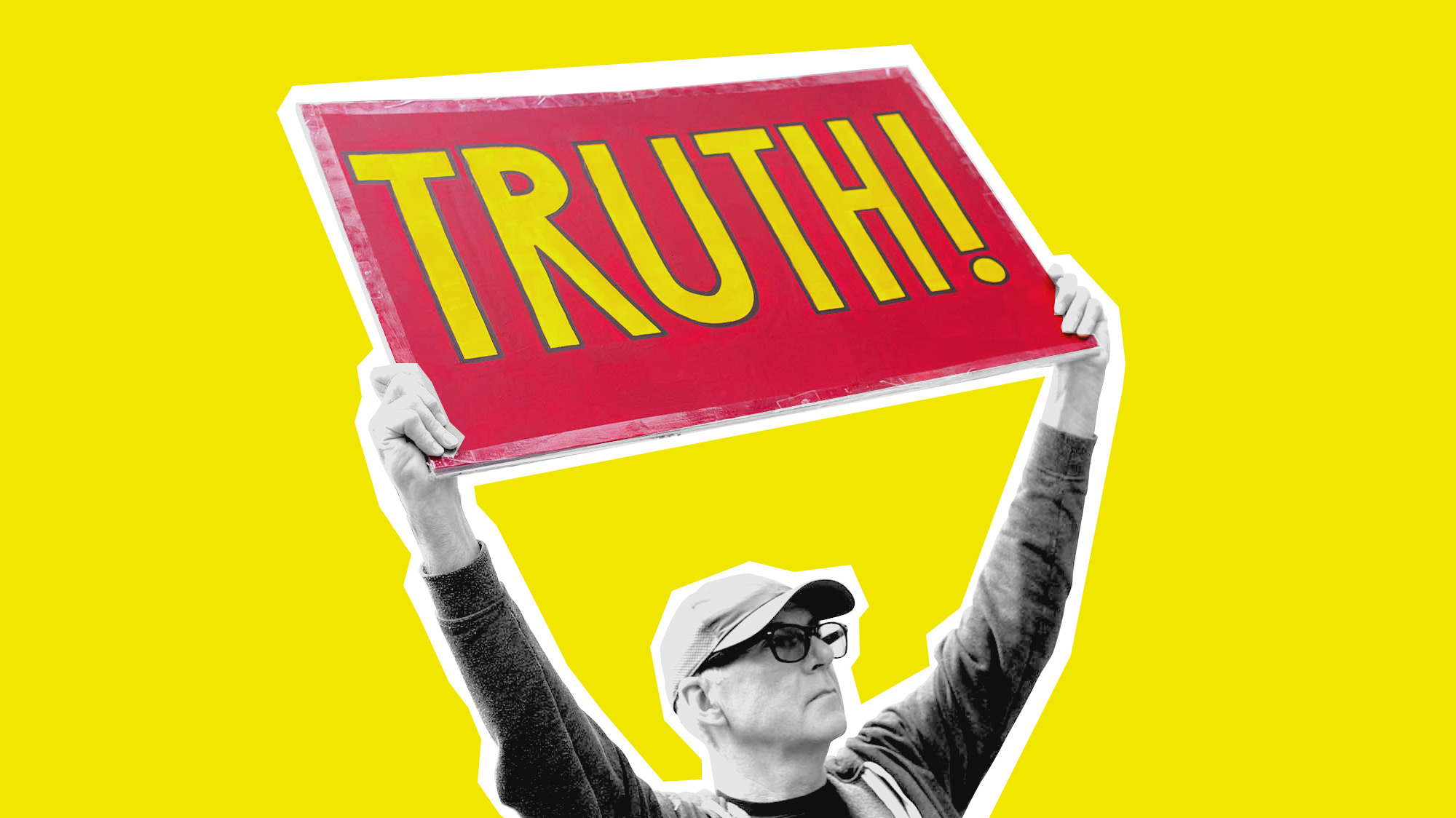It’s easy to feel lonely right now—this time of year, this moment in history. You might be surrounded by people you love but who no longer seem to share your core values. You might be separated from loved ones by a border or wall. Or you might just be following the news, watching journalists calmly delivering updates on what seem unspeakable political developments, and wondering whether you’re the only one shocked.
You are not.
Please remember that. You are not the only one who feels the way you do. I know because here at Mother Jones, we send out reporters every day, exposing corruption but also courage and change. And every day, we hear from people like you, who wrestle with what’s going on in the country and decide to be part of something better. I run into you even when I’m not working: the guy who finally fixed my roof. A friend’s kid’s teacher in Minnesota. The security guard on a college campus in Florida. A cab driver in Chicago. A little chitchat, I admit to working for a magazine, and it’s “I love Mother Jones!” I get to hear about the story that stuck with you, or the tweet that made you laugh, and, often, how reading a magazine like this reminded you that you were not crazy, and not alone.
A few weeks ago I wrote a column about journalism, resistance, and a comment that the top editor of the New York Times had made about Mother Jones. I asked for your input on what journalists’ role is at a time like this, and nearly 4,000 of you responded. Here’s the poll that was embedded in that story (you can still cast your vote):

More than 500 of you took the time to write a more detailed response, and more are still coming in every day. I wanted to share some of these with you because they are really a shot in the arm for anyone who cares about fearless, independent journalism:
Angelica Hernandez, 27, from Indianapolis: “The difference between Mother Jones and the Times is the fact that you seek to reveal the truth, and facts, for the sake of the collective. The Times attempts to show both sides of a story that only has one, the facts.”
Libbie Martin, 59, from Grass Valley, California: “Hold the elites to account; dig for the truth, no matter how inconvenient or difficult; stop the horse race and false equivalency shit (excuse my language); dive deep into the politicians and who they get money from. Make me proud of my former profession.”
Coyote Osborne, 49, Centennial, Colorado: “Call lies lies. Not misstatements. Not misrepresentations.”
Ellen Whitford, 67, Seattle: “I expect ALL legitimate publications and news outlets to adhere to facts, and report it, but I expect MoJo to focus almost solely on holding the powerful accountable and to write about wrongs in order to right/correct those wrongs.”
Mohamed, 29, London: “For me, journalism helps us to understand how and why the world works the way it does. It helps us see patterns—historical, economic, social—and works to lend context to all the news that’s breaking all the time.”
A reader in rural Nevada (who wanted to be anonymous): “Journalism’s role is to research and present the truth, period. I trust MoJo. You go for it all when other publications get lazy or just don’t care about their readers—or have their own motives for delivering half-truths at best.”
Do you have a thought to share? We’re still collecting them, so please let us know at the bottom of my journalism-and-resistance column.
That’s who you are, MoJo readers. You know that truth makes a difference when you put it to work. And wow, have you been putting it to work.
This, too, we know because you told us: Some of you went to airports in January 2017. Some of you knocked on doors in 2018. Some of you started groups in your towns—to help refugees, to register voters, to support each other in running for something. Some of you bonded with your families over this work, and others found kinship online. And many of you turned to Mother Jones for help untangling the chaos in the headlines, for solid, fact-checked, in-depth information and transparency about journalism’s values.
One of you is a retired cop who wrote us: “While I may have been inwardly sympathetic to some of the few protests I witnessed from the opposite side of the barricades during my time as an officer, I would never have imagined myself participating in one. [Recently], I have participated in three protests and/or rallies. I also attended my first Congressional Town Hall meeting.”
One of you is a social worker who wrote a note to reporter Julia Lurie after reading her in-depth story on children affected by the opioid epidemic. “I am a Christian conservative Republican. I live in Ohio. I cried after reading about the children in your story. I have never emailed the writer of anything I have read online. But your story has really touched me.”
There are so many of you. And every one of you sometimes feel lonely and wonders whether this, right now, is just the way things are going to be.
Back in 2016, on election night, our staff did what political journalists do every election night—order pizza, grab beer, and watch the results roll in. As the map came into focus, our editor, Clara Jeffery, and I retreated to my office and stared at the floor. What do we do, we thought, in an environment where an outright enemy of the press (among so many other things) has been elected to the nation’s highest office? After a long silence, we knew the answer: We needed to do our job, but more so. We would not normalize or make excuses or pretend that this was all just sports. We would, Clara wrote in a column published that night, “shine light into dark corners, expose abuses of power, call out cronyism and corruption, and fight like hell for the living”—including those who supported a president who would betray them.
We’ve all aged since then, more than the calendar suggests. There are weeks that feel like six months. There are days when it seems as if up is down, white is black, and brazen lies are normal from the attorney general of the United States.
But there have been bleak times before. Mary Harris Jones, our namesake, lived at a moment when giant corporations reigned supreme, women couldn’t vote, lynchings were routine, and the US government massacred its own people. “Mother” Jones herself held views on women’s rights and immigration that we would find repugnant were we to meet her. But the one thing she did, as changemakers have through the ages, was to not accept things as they were. She did not accept the role assigned to an older, penniless, immigrant woman, and she did not accept that a modern economy required children to work 12-hour days in the mills. Here’s a story she told in her autobiography, of a visit to Kensington, in Philadelphia:
“Every day little children came into Union Headquarters, some with their hands off, some with the thumb missing, some with their fingers off at the knuckle. They were stooped things, round shouldered and skinny. Many of them were not over ten years of age, the state law prohibited their working before they were twelve years of age…
I asked the newspaper men why they didn’t publish the facts about child labor in Pennsylvania. They said they couldn’t because the mill owners had stock in the papers.
‘Well, I’ve got stock in these little children,’ said I, ‘and I’ll arrange a little publicity.'”
Had Mother Jones the magazine existed then, Mother Jones the woman could have found an outlet to expose child labor, because no one owns our stock except you, our readers. MoJo was founded 43 years ago as a reader-supported nonprofit to ensure that we could go after the stories others could not, and call things what they are when others would not. We don’t have to appease timid owners or shareholders, and we don’t have to hew to the false equivalency that has once again been playing out in much of the coverage of impeachment.
But what we do have to do, because there are no deep-pocketed owners or investors bankrolling our reporting, is ask for your support. December is our most important fundraising month, and this year we have a big $600,000 goal to make our budget. As I’m writing this, we’re a good bit behind where we should be to get there, and we wondered whether maybe some of you might be feeling defeated, given how broken both media and politics can feel right now. So I wanted to share the strength of the MoJo community—strength that I’m lucky to get to see every day.
If you choose to join us with a year-end gift supporting fearless, truthful journalism in 2020, that would be wonderful. But regardless of what you decide, know that you aren’t alone, and you aren’t powerless. The arc just bends slowly.
















